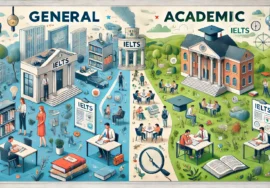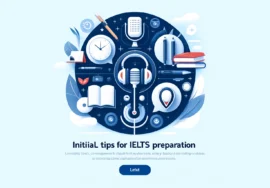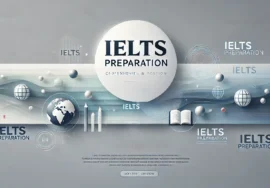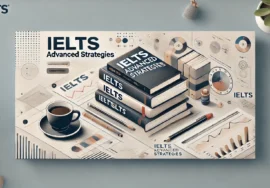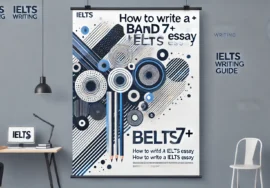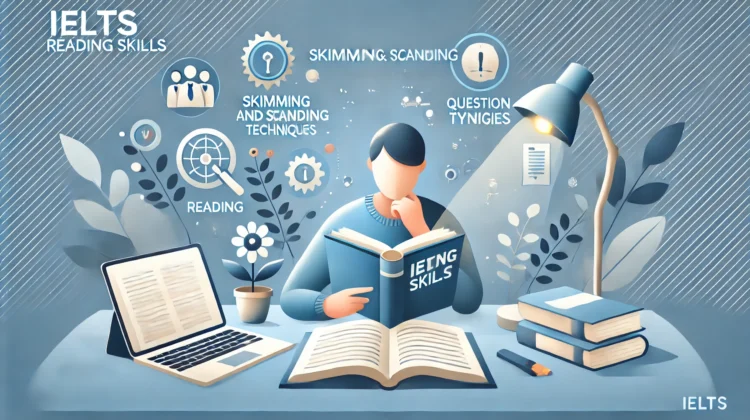
How to Improve IELTS Reading Skills
Improve your IELTS Reading skills with effective strategies, including skimming, scanning, handling complex texts, and mastering common question types. Learn how to practice for better results.
How to Improve IELTS Reading Skills
The IELTS Reading section is one of the most challenging components of the exam. It tests your ability to read, understand, and interpret a variety of texts under time constraints. To excel in this section, candidates must be familiar with different question types, effective reading strategies, and the best ways to practice. This guide provides an in-depth approach to improving IELTS Reading skills, covering essential techniques and strategies for success.
Understanding the IELTS Reading Section

The IELTS Reading section consists of three passages with increasing difficulty. The test lasts for 60 minutes and includes 40 questions that assess different reading skills such as comprehension, inference, and critical analysis. There are two versions of the IELTS Reading test:
- Academic IELTS Reading: Includes passages from books, journals, and newspapers with a more formal tone.
- General Training IELTS Reading: Focuses on everyday English, with texts from advertisements, instructions, and workplace-related materials.
Each passage is designed to test different aspects of reading ability, such as locating specific information, understanding opinions, and identifying main ideas. Time management is a key factor in success, as candidates must navigate through dense texts efficiently within the given timeframe.
Common Question Types in the Reading Section

To perform well, candidates should familiarize themselves with the various question types that appear in the IELTS Reading section:
- Multiple-choice questions: Require selecting the correct answer from a set of options.
- True/False/Not Given or Yes/No/Not Given questions: Assess factual understanding and ability to distinguish between provided and implied information.
- Matching headings: Involves assigning headings to different sections of the text.
- Sentence completion: Requires filling in missing words from the passage.
- Summary, note, table, or flowchart completion: Tests comprehension by asking candidates to complete structured formats.
- Matching information: Involves finding specific details in the passage.
- Matching sentence endings: Requires correctly linking sentence halves.
- Short answer questions: Demand concise responses based on the text.
- Diagram labeling: Requires identifying parts of an illustration using information from the passage.
- Global multiple-choice questions: Test overall understanding of the passage’s theme and purpose.
Understanding these question types in advance allows test-takers to approach each one strategically, improving both accuracy and speed.
Essential Skimming and Scanning Techniques

Efficient reading techniques can help you locate key information quickly without reading every word:
- Skimming: Quickly reading through the passage to grasp the main idea and overall structure.
- Scanning: Looking for specific keywords, numbers, or phrases relevant to the questions.
- Predicting answers: Using contextual clues to anticipate possible answers.
- Recognizing synonyms and paraphrasing: IELTS Reading questions often use different words than the text, so recognizing synonyms is crucial.
- Understanding paragraph structure: Identifying topic sentences and supporting details to extract key information more effectively.
Strategies for Dealing with Complex Texts

Many IELTS Reading passages contain complex vocabulary and sentence structures. Here’s how to tackle them:
- Break down long sentences: Identify the subject, verb, and object to simplify meaning.
- Use contextual clues: Understand unfamiliar words based on surrounding text.
- Ignore difficult words when necessary: Focus on the overall meaning rather than getting stuck on a single word.
- Identify the main argument: Recognizing the author’s opinion or purpose can help answer inference-based questions.
- Recognizing transition words: Words like “however,” “therefore,” and “moreover” provide important clues about relationships between ideas.
- Paraphrasing complex sentences: Rewriting difficult phrases in simpler terms can improve understanding.
Reading Strategies for Different Question Formats
Each type of IELTS Reading question requires a tailored approach:
- For multiple-choice questions: Read the question first, underline keywords, and eliminate incorrect options.
- For True/False/Not Given questions: Verify if the statement exactly matches, contradicts, or isn’t mentioned in the passage.
- For matching headings: Read the first and last sentence of each paragraph for the main idea.
- For fill-in-the-blanks: Predict the type of word needed (noun, verb, adjective) before looking for the answer.
- For summary completion: Use synonyms and paraphrasing skills to match information accurately.
- For matching information: Identify keywords in the questions and scan the passage for their location.
- For diagram labeling: Locate the part of the text that describes the diagram before attempting to answer.
- For global questions: Read the introduction and conclusion carefully to determine the main idea.
How to Practice Reading Effectively

To enhance IELTS Reading skills, consistent practice is essential. Follow these tips:
- Read a variety of texts daily: Newspapers, academic articles, and blogs can improve comprehension skills.
- Time yourself: Practice completing passages within the 20-minute limit per passage.
- Take full-length practice tests: Simulating test conditions helps build stamina.
- Analyze mistakes: Review incorrect answers to understand patterns of errors.
- Expand vocabulary: Keep a word journal and learn synonyms and common IELTS terms.
- Practice paraphrasing: Rewrite sentences using different words to strengthen comprehension.
- Summarize passages: Condensing long passages into a few sentences improves retention and understanding.
Additional Tips for IELTS Reading Success
- Follow instructions carefully: If a question asks for “no more than two words,” adhere to the limit.
- Underline key information: Highlight important details as you read.
- Stay calm and focused: Avoid overanalyzing questions to save time.
- Improve reading speed: Regular timed practice will help boost efficiency.
- Engage in active reading: Ask yourself questions about the text to enhance understanding.
- Use past papers: Practicing with authentic IELTS reading tests improves familiarity with question patterns.
- Develop a guessing strategy: If time is running out, make educated guesses rather than leaving questions blank.
Conclusion
Mastering IELTS Reading requires a combination of strategic reading techniques, familiarity with question types, and consistent practice. By developing strong skimming and scanning skills, tackling complex texts efficiently, and practicing under timed conditions, candidates can significantly improve their reading performance. With dedication and the right approach, achieving a high band score in IELTS Reading is within reach. Moreover, integrating active reading habits into daily life will not only enhance IELTS performance but also contribute to long-term language proficiency.



